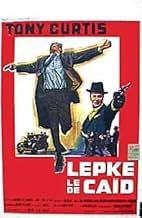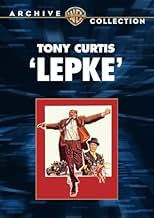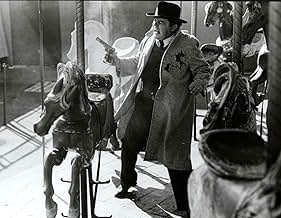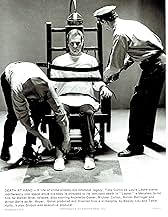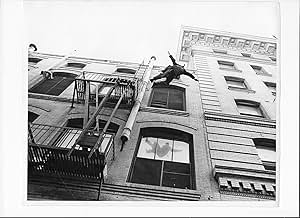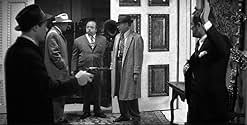Louis 'Lepke' Buchalter is head of Murder Inc., the syndicate that spattered the headlines of the day with blood.Louis 'Lepke' Buchalter is head of Murder Inc., the syndicate that spattered the headlines of the day with blood.Louis 'Lepke' Buchalter is head of Murder Inc., the syndicate that spattered the headlines of the day with blood.
- Director
- Writers
- Stars
- Director
- Writers
- All cast & crew
- Production, box office & more at IMDbPro
5.5472
1
2
3
4
5
6
7
8
9
10
Featured reviews
Might've Been Something
A cross between yet another 1970's THE GODFATHER clone and a drive-in exploitation with sex and violence, future Cannon Films co-owner Menahem Golan directs Tony Curtis as LEPKE... beginning with a younger version with an intense Barry Miller in turn-of-the-century America, committing a crime and about to be locked up... a shame since more time should have been spent on those youthful years...
Instead, right when the titular Jewish mobster gets out, he's already a 50-something miscast Tony Curtis, who at one point talks Milton Berle into marrying docile daughter Anjanette Comer... and about thirty-minutes later, when the detectives start knocking, she's supposed to have realized her mistake at marrying a lethal crime boss...
The shame is that we never experience Lepke's climb from rags to riches, nor do we get any inclination of how all the dirty work goes down... with the exception of a deliciously lethal short Italian who takes out Lepke's enemies...
So it's never exactly clear why he has either crooked friends or dangerous enemies since scene-after-scene entails dialogue more about crime than acting upon it... hopscotching into violent deaths (one has a mobster cutting the neck of a hooker while having sex) that, while pushing the R-rated envelope, has little content inside: what's here (including Vic Tayback and THE GODFATHER brother-in-law Gianni Russo) seems more of a 2-hour TV-movie trailer than a fulfilling cinematic mob biopic.
Instead, right when the titular Jewish mobster gets out, he's already a 50-something miscast Tony Curtis, who at one point talks Milton Berle into marrying docile daughter Anjanette Comer... and about thirty-minutes later, when the detectives start knocking, she's supposed to have realized her mistake at marrying a lethal crime boss...
The shame is that we never experience Lepke's climb from rags to riches, nor do we get any inclination of how all the dirty work goes down... with the exception of a deliciously lethal short Italian who takes out Lepke's enemies...
So it's never exactly clear why he has either crooked friends or dangerous enemies since scene-after-scene entails dialogue more about crime than acting upon it... hopscotching into violent deaths (one has a mobster cutting the neck of a hooker while having sex) that, while pushing the R-rated envelope, has little content inside: what's here (including Vic Tayback and THE GODFATHER brother-in-law Gianni Russo) seems more of a 2-hour TV-movie trailer than a fulfilling cinematic mob biopic.
Tony Curtis provides a convincing performance
This movie is one in which Tony Curtis gives one of his best performances as Louis "Lepke" Buchalter. Curtis ,better known for his romantic and comedic roles proved to audiences that he could potray a gangster too, and does a damn good job of it!
More of a 40s and 50s Film Noir throwback
Gangster pictures in the 70s get unfairly maligned. I put this down to being automatically being compared to The Godfather. The reason it's unfair is The Godfather is the first ever epic crime drama. Epics clock in at around 3 hours. It was like Giant from the 50s but with the mob as the focus. Every other movie in this genre was a Film Noir crime drama. Movies like Lepke, Capone and the Valachi Papers are like those movies but with more explicit language and graphic violence. As compared to other Neo Noir movies, this is a pretty good movie.
There's a fair amount of poetic license crowding out the timeline of actual events. There a few more good dramatic acting scenes (referenced in the goofs) which I appreciate seeing because this is a well acted movie with several surprising performances.
This might be Tony Curtis' best role as a leading man in the 70s. The movie had poor box office but I put that down to The Godfather effect. Crime Drama epics are still pretty rare (De Palmas Scarface is another, Scorsese didn't begin making them until after Good Fellas). Not many can manage them but if you like old time b movie Film Noir movies, this is one you might enjoy as well as Capone which features a strangely effective portrayal of the title character by Ben Gazzara.
There's a fair amount of poetic license crowding out the timeline of actual events. There a few more good dramatic acting scenes (referenced in the goofs) which I appreciate seeing because this is a well acted movie with several surprising performances.
This might be Tony Curtis' best role as a leading man in the 70s. The movie had poor box office but I put that down to The Godfather effect. Crime Drama epics are still pretty rare (De Palmas Scarface is another, Scorsese didn't begin making them until after Good Fellas). Not many can manage them but if you like old time b movie Film Noir movies, this is one you might enjoy as well as Capone which features a strangely effective portrayal of the title character by Ben Gazzara.
Curtis rocks
Brutal, straightforward bio-pic of the notorious Jewish gang boss. Writers Wesley Lau and Tamar Hoffs tell their sprawling story with fidelity to the headlines and nary a hint of what made this complicated mobster-cum-family man tick. (Curiously, there's never a mention of Lepke's infamous Murder Inc. operation, opting instead to concentrate on his drug trafficking and extortion enterprises.) Luckily, Tony Curtis' riveting performance fills in what the writers' have neglected, transforming Lepke Buchalter into a disturbingly three-dimensional character. Tossing off Yiddishisms with a sneer, keeping his impish smile to a minimum, he plays Lepke as a stone-faced ruthless street thug with a yen for power and conservative family values. It's as though Sidney Falco from "Sweet Smell of Success" had finally taken over J.J. Hunsecker's column. Whether snarling out death orders or tremulously asking his prospective father in law for permission to marry, Curtis invests the role with a skillful understatement (as well as a Bronx boy's veracity).
In the film's best scene, a queasy mixture of eroticism and complex emotions, Lepke is on the lam and holed up in a trollop's apartment. As the woman brazenly tempts him, Curtis silently and eloquently conveys the anguish of a lonely man struggling to remain faithful to his wife.
The director Menachem Golan is rarely this subtle, striving for ethnic texture and period color and overdoing both. Grubby hook-nosed Jews, swarthy pasta-eating Italians, and outsize Fedoras are shoved in our face. The violence is luridly overblown (a prostitute gets an ice pick thrust in her neck during lovemaking), and sometimes downright preposterous (a plate of spaghetti camouflages an explosive device). But just try to turn away from Curtis. With Anjanette Comer as Lepke's doting wife; Milton Berle, surprisingly restrained as her father; Barry Miller as the young Lepke; Vaughn Meader as an unlikely Walter Winchell.
In the film's best scene, a queasy mixture of eroticism and complex emotions, Lepke is on the lam and holed up in a trollop's apartment. As the woman brazenly tempts him, Curtis silently and eloquently conveys the anguish of a lonely man struggling to remain faithful to his wife.
The director Menachem Golan is rarely this subtle, striving for ethnic texture and period color and overdoing both. Grubby hook-nosed Jews, swarthy pasta-eating Italians, and outsize Fedoras are shoved in our face. The violence is luridly overblown (a prostitute gets an ice pick thrust in her neck during lovemaking), and sometimes downright preposterous (a plate of spaghetti camouflages an explosive device). But just try to turn away from Curtis. With Anjanette Comer as Lepke's doting wife; Milton Berle, surprisingly restrained as her father; Barry Miller as the young Lepke; Vaughn Meader as an unlikely Walter Winchell.
Not bad, but inaccurate
Lepke traces the beginnings of Louis Lepke Buchalter from his days as a child thief to his eventual demise at the hands--or feet, if you will--of Old Sparky.
Pros: Tony Curtis gives an excellent performance as Lepke, conveying charm as well as ruthlessness. The other actors involved also give decent performances, particularly Milton Berle as Lepke's father-in-law.
As for the cons, the period sets don't look authentic. There was a big change in the streets and nightclubs from the 1920's to the 1940's in New York--not in this movie. Additionally, it's shown that Jack "Legs" Diamond was murdered by a contract killer, an ice pick in his ear. Nope. He was murdered in bed by at least three people. I guess killing him the old-fashioned way wasn't colorful enough for the producers.
Altogether, the film is fun to watch, buoyed by Curtis' performance, even though he doesn't age very much during his rise and eventual fall. But it's hardly accurate.
Pros: Tony Curtis gives an excellent performance as Lepke, conveying charm as well as ruthlessness. The other actors involved also give decent performances, particularly Milton Berle as Lepke's father-in-law.
As for the cons, the period sets don't look authentic. There was a big change in the streets and nightclubs from the 1920's to the 1940's in New York--not in this movie. Additionally, it's shown that Jack "Legs" Diamond was murdered by a contract killer, an ice pick in his ear. Nope. He was murdered in bed by at least three people. I guess killing him the old-fashioned way wasn't colorful enough for the producers.
Altogether, the film is fun to watch, buoyed by Curtis' performance, even though he doesn't age very much during his rise and eventual fall. But it's hardly accurate.
Did you know
- TriviaStar Tony Curtis with author Peter Golenbock revealed in Curtis' autobiography "American Prince: A Memoir" (2008) that he became heavily addicted to cocaine during production of this picture and would remain so for the next decade.
- GoofsIn the movie, Lepke's trusted partner Jacob "Gurrah" Shapiro is shot to death at Coney Island while trying to protect Lepke from assassins. In real life, Shapiro turned himself in to the authorities, accepted a prison term, and actually outlived Lepke by several years, dying in prison of natural causes in 1947.
- Alternate versionsCBS edited 20 minutes from this film for its 1983 network television premiere.
- How long is Lepke?Powered by Alexa
Details
Box office
- Budget
- $900,000 (estimated)
- Runtime
- 1h 50m(110 min)
- Sound mix
- Aspect ratio
- 2.35 : 1
Contribute to this page
Suggest an edit or add missing content


